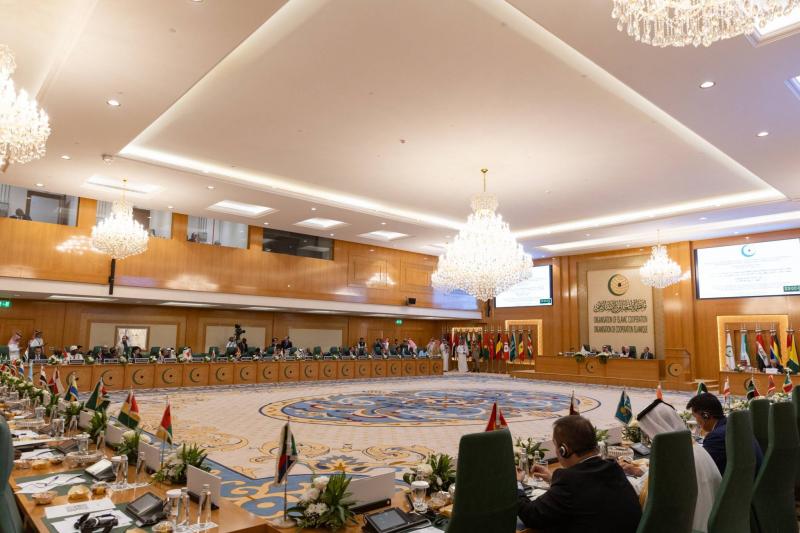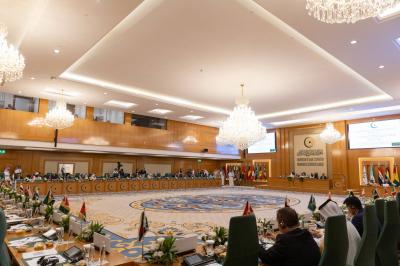Lebanese Foreign Minister Abdullah Bou Habib, during his participation in the extraordinary ministerial meeting of the Organization of Islamic Cooperation in Jeddah, emphasized that "the international community today has a major responsibility to stop double standards and blind support for Israel." He pointed out that "the blockade imposed on Gaza, affecting more than two million Palestinians, constitutes a gross crime against humanity." Bou Habib stated that "Lebanon, a country that loves peace, sends a stark warning today: the continued aggression against Gaza could ignite fires that may engulf the entire region."
Saudi Foreign Minister Faisal bin Farhan Al Saud affirmed during the meeting that "the international community must take a stand regarding the protection of Palestinians in Gaza," calling for "creating conditions for peace that guarantee the rights of the Palestinian people."
Palestinian Foreign Minister Riyad al-Maliki then spoke, stating that "Gaza is facing unprecedented genocide." He noted that "Israel deliberately bombed the Baptist hospital the previous day, claiming it was a warning," asserting that "Israel's statements regarding Gaza strip the Palestinian people of their humanity." Al-Maliki clarified that "anyone who granted Israel a mandate and supplied it with weapons is complicit and bears responsibility for the mass killings," pointing out that "the Israeli government is dealing with us as if we were in a lawless state," revealing that "Israel kills a Palestinian child every 15 minutes." He noted, "We warned of the worsening situation in Gaza and the danger of the continued blockade," affirming that "Israel's justification that its actions are in self-defense must be rejected," and stressing that "the cover for the crimes of the Israeli army must be lifted." He expressed that "the world has failed all our efforts to reach a solution based on international law, leaving the colonizer free to act."
Turkish Foreign Minister Hakan Fidan confirmed, in his address at the meeting in Jeddah, that "nothing justifies the collective punishment of the Palestinian people and depriving them of fuel, water, and food," pointing out that "the Palestinians are in continuous suffering and facing certain death." He stated that "a two-state solution is the optimal and permanent solution, and there can be no peace without the Palestinian people," noting that "an unconditional ceasefire must be achieved, and Israel's atrocities are not met with the necessary punishment."
Iranian Foreign Minister Hossein Amir Abdollahian mentioned that "Israel executed a massacre at the Baptist hospital in Gaza." He noted, in his speech during the meeting, that "the United States bears responsibility for the crimes committed in Gaza," stressing that "the Palestinian issue has become the focus of the unity of the Islamic world today." Abdollahian pointed out that "the Israeli army, with American and Western support, is committing war crimes, ethnic cleansing, and genocide," explaining that "the bombing of civilians at the hospital in Gaza yesterday does not align with any logic." He emphasized that "Palestine must remain the primary issue for the Islamic world," indicating that "the Al-Aqsa Flood operation has proven that the Palestinian issue is still alive." He asserted that "it is not logically possible that the resistance was the one that bombed the Baptist hospital in Gaza," adding that "it is necessary to impose political and economic sanctions on the Zionist entity by Islamic countries." Abdollahian strongly condemned any "forced displacement of Gaza's residents, considering it another war crime by the Zionist entity," announcing that "the time has come for Islamic countries to sever their relations with Israel in protest against its crimes."
Kuwaiti Foreign Minister Ahmad Nasser Mohammed Al-Sabah stated that "his country has repeatedly warned against dealing with double standards concerning the Palestinian issue," pointing out that "Israel is attempting to change the legal status in Palestine." He confirmed Kuwait's commitment to the choice of just and comprehensive peace and the establishment of a Palestinian state.




